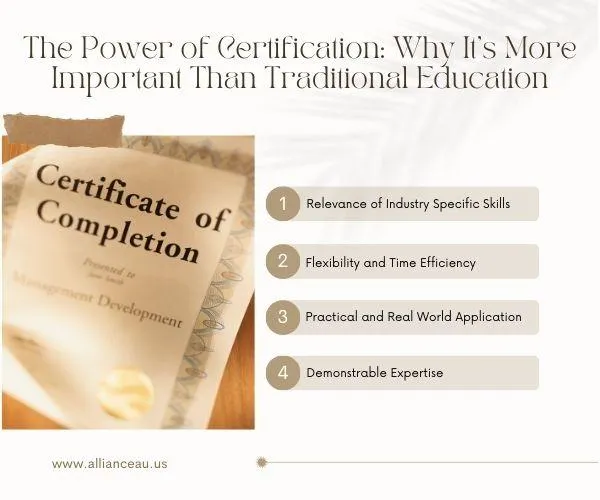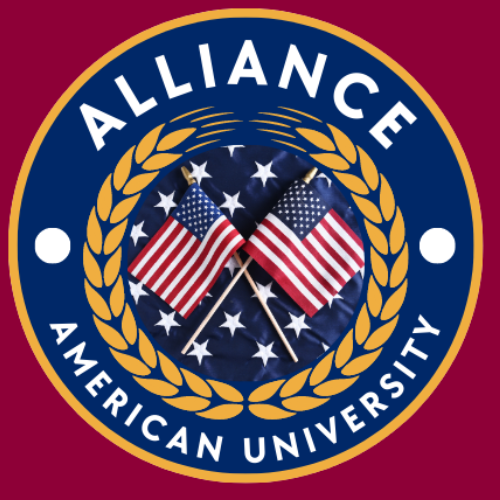
The Power of Certification: Why It's More Important Than Traditional Education
"Education is important, but certification is the bridge that connects knowledge with practical success." - Unknown
Introduction:
In today's rapidly evolving job market, the traditional notion of education is being challenged. While a college degree has long been regarded as the golden ticket to success, a new contender has emerged – certification. In this blog post, we will delve into the reasons why certification is gaining momentum and why it is increasingly considered more important than traditional education.
By exploring the benefits, flexibility, and relevance of certification, we will uncover how it equips individuals with the necessary skills and knowledge to thrive in the modern workforce.

1. The Relevance of Industry-Specific Skills
One of the key advantages of certification is its laser focus on industry-specific skills. Traditional education often provides a broad foundation of knowledge, but it may not address the specific needs and requirements of various industries.
Certification, on the other hand, hones in on the practical skills and knowledge that employers demand. Whether it's in fields like technology, healthcare, or digital marketing, certification programs are designed to equip individuals with the precise expertise needed to excel in their chosen industry.
2. Flexibility and Time Efficiency
Traditional education typically requires several years of commitment, making it a time-consuming endeavor. Conversely, certification programs are often shorter and more flexible. Many certifications can be obtained through online platforms, allowing individuals to learn at their own pace and while maintaining their existing commitments.
This flexibility not only attracts working professionals seeking to enhance their skills but also offers opportunities for career changers to acquire new qualifications quickly.
3. Rapidly Evolving Industries and Changing Skill Demands
Industries are evolving at an unprecedented pace, driven by technological advancements and shifting market demands. Traditional education systems, with their rigid structures and long development cycles, often struggle to keep up with these changes.
Certification programs, however, can be updated and modified more swiftly to align with industry trends and emerging technologies. This agility ensures that individuals who hold certifications possess the most up-to-date and relevant knowledge and skills required by employers.
4. Practical Application and Real-World Experience
Certification programs prioritize hands-on learning experiences, enabling individuals to develop practical skills that can be directly applied in real-world scenarios. While traditional education may focus heavily on theory, certification emphasizes practical application, ensuring that graduates are job-ready upon completion.
Employers increasingly value candidates who can demonstrate their abilities through practical projects, simulations, or internships. Certification programs often include practical assessments and case studies, providing valuable opportunities for learners to showcase their skills and stand out in a competitive job market.
5. Demonstrable Expertise and Competitive Advantage
Certifications serve as tangible proof of expertise and competence. Employers seek candidates who can demonstrate their qualifications through industry-recognized certifications, giving them confidence in the applicant's abilities.
Additionally, certification holders often gain a competitive edge over candidates with only a traditional education background. When faced with two candidates of similar educational backgrounds, employers are more likely to favor the one with relevant certifications that validate their specialized skills and dedication to professional growth.
6. Continuing Professional Development
Certifications promote lifelong learning and continuous professional development. Many certification programs require individuals to maintain their certification by participating in ongoing education or renewal processes.
This commitment to staying updated with industry advancements ensures that certified professionals remain knowledgeable and relevant in their fields. The emphasis on continuous learning also encourages individuals to pursue additional certifications or specialized tracks, further enhancing their skills and marketability.
7. Networking Opportunities
Certification programs often provide opportunities to connect with a community of professionals in the same field. This networking can be invaluable for career growth, as it allows individuals to exchange knowledge, share experiences, and access job opportunities.
Networking within a certified community can lead to mentorship possibilities, collaborations, and exposure to industry trends. The connections made through certification programs can contribute significantly to professional success and open doors to new possibilities.
8. Cost-Effectiveness
Compared to traditional education, certification programs can be a more cost-effective option. Pursuing a degree can involve significant tuition fees, accommodation costs, and other expenses. Certification programs, on the other hand, often have a lower financial barrier to entry, making them more accessible to a wider range of individuals.
Additionally, certification programs usually have a shorter duration, allowing individuals to enter the job market and start earning sooner. This combination of affordability and quicker time to completion makes certification an appealing choice for those seeking to gain specialized skills without the long-term financial commitments of traditional education.
9. Global Recognition and Portability
Many certifications hold international recognition, allowing individuals to showcase their expertise and qualifications on a global scale. This portability is particularly valuable in today's interconnected world, where job opportunities may span different countries or regions.
Holding a certification that is recognized and respected globally can enhance career prospects and provide greater flexibility in pursuing employment opportunities in diverse locations.
Conclusion
Certification is rapidly gaining prominence as a valuable alternative to traditional education. Its industry-specific focus, flexibility, practical application, adaptability, and competitive advantages position it as a vital tool for career success. With recognition, continuing professional development, networking opportunities, cost-effectiveness, and global portability, certifications offer individuals the means to stay relevant, enhance their skills, and navigate the ever-changing job market.
As industries evolve and employers seek professionals with specialized expertise, certification is becoming an increasingly essential credential. Embracing the power of certification equips individuals with the necessary tools to thrive in their chosen fields and opens doors to a world of opportunities. While traditional education remains valuable, certification has emerged as a powerful alternative that caters to the evolving needs of the job market.
The relevance, flexibility, practicality, adaptability, and competitive advantage offered by certifications make them a compelling choice for individuals seeking career advancement or a pathway into a new industry. By focusing on industry-specific skills, offering practical application, and staying up-to-date with industry demands, certifications empower individuals with the expertise required to excel in their chosen fields. As the modern workforce continues to prioritize skill-oriented qualifications, the value of certification is set to rise further, reshaping the future of education and employment.
ABOUT AAU
Welcome to AAU, a premier institution dedicated to revolutionizing higher education in the USA. As an esteemed university, we pride ourselves on our commitment to delivering transformative education that incorporates cutting-edge technology to create a dynamic learning experience for our students.
IMPORTANT LINKS




